Kellen Smetana
“Ok Kellen,” said Theo as we sat analyzing maps in Khiva, “we just hauled our butts off from Tashkent, putting in 150km days over road construction and through sickness and extreme heat. Now, it’s 1150km from here to the Caspian Sea over some of the worst roads and most inhospitable terrain on the planet. How fast do you think we can make it?”
“Hmmm, 8 days... I think we can do it.”
“Ha! 8 days, I’m not so sure, but I’m in. If we make it in 8 days, we’re heroes.”
Eight days later we were sitting on a bench in Aktau, Kazakhstan on the Caspian Sea reminiscing on this conversation. But we were no glamorous dragon-slaying heroes; we were more like Rocky Balboa, just able to sustain an absolute beatdown for a very, very long period of time. Taken as a whole, the segment from Tashkent to Aktau was definitely the most difficult section of the trip. If I were to plot this difficulty level on a graph, it would look like a half-parabola that skyrockets the closer we got to the Caspian. It was tough. Those of you keener readers out there know that the blog is a bit delayed and you will now see why we dropped off the grid for a couple weeks because frankly, in most of these places, there is no grid.
In his post, Cory wrote about the difficulty of the ride to Samarkand, where, I found out later, we pushed him to the point of tunnel-vision. Instead of throwing anger at his brother for encouraging him up “the last hill” and “the last hill” and then “the last hill” before Samarkand, he chose to direct it at his body for not being able to keep up. He’s a tough cookie, that one. Theo and I pushed him hard because we thought he could handle it and he needed to, as it didn’t get any easier. He did.
The ride to Bukhara and then Khiva was laden with 200km of construction, sand-dune covered roads, extreme heat, incessant flies, and sickness.
“Ok Kellen,” said Theo as we sat analyzing maps in Khiva, “we just hauled our butts off from Tashkent, putting in 150km days over road construction and through sickness and extreme heat. Now, it’s 1150km from here to the Caspian Sea over some of the worst roads and most inhospitable terrain on the planet. How fast do you think we can make it?”
“Hmmm, 8 days... I think we can do it.”
“Ha! 8 days, I’m not so sure, but I’m in. If we make it in 8 days, we’re heroes.”
Eight days later we were sitting on a bench in Aktau, Kazakhstan on the Caspian Sea reminiscing on this conversation. But we were no glamorous dragon-slaying heroes; we were more like Rocky Balboa, just able to sustain an absolute beatdown for a very, very long period of time. Taken as a whole, the segment from Tashkent to Aktau was definitely the most difficult section of the trip. If I were to plot this difficulty level on a graph, it would look like a half-parabola that skyrockets the closer we got to the Caspian. It was tough. Those of you keener readers out there know that the blog is a bit delayed and you will now see why we dropped off the grid for a couple weeks because frankly, in most of these places, there is no grid.
In his post, Cory wrote about the difficulty of the ride to Samarkand, where, I found out later, we pushed him to the point of tunnel-vision. Instead of throwing anger at his brother for encouraging him up “the last hill” and “the last hill” and then “the last hill” before Samarkand, he chose to direct it at his body for not being able to keep up. He’s a tough cookie, that one. Theo and I pushed him hard because we thought he could handle it and he needed to, as it didn’t get any easier. He did.
The ride to Bukhara and then Khiva was laden with 200km of construction, sand-dune covered roads, extreme heat, incessant flies, and sickness.
We motored along under our mantra “GO GO G’Ozbekistan,” a play on the Uzbek spelling of their country. To avoid the heat we were usually riding by 6am and we would sleep through the heat of the day at a chaikhana (teahouse/restaurant) where we had just eaten lunch. The worst part was not the lack of air-conditioning but rather the swarm of flies that painted us like we were new roadkill. To avoid the heat we sometimes rode by moonlight as well. At 10:30 one particular night we chose to lay out our sleeping bags right on the road (blocked new construction) as we would be off by 5am the next day.
From Khiva it was a rough 175km day against the wind to Nukus, the last town between us and the serious Karakalpak and Kyzylkum Deserts. Beyond Nukus only two towns lay between us and the Caspian coast 1000 kilometers away: Qongirat, 100km from Nukus, and Beyneu, 400km after that. Between them, almost nothing: sand, power lines, railroad tracks, and a few camels. Fortunately there were three villages en route with chaikhanas next to the road that doubled as truck-stops and proved to be true saviors for us. We planned our route chaikhana to chaikhana (often over 150kms between) to ensure access to food and water. As it was we were carrying 8-12 liters of water each; the first day we ran out 40km from the chaikhana – “never again,” was a lesson spoken quickly through cracked lips.
As we always arrived at these chaikhanas starving, downtrodden, and dehydrated, I did not fully appreciate their singularity until after the fact. They are the only oases for hundreds of miles in the desert and consequently serve as true 21st century caravanserais, mixing local camel herders, Russian truckers, gypsy families, and touring cyclists. It’s difficult to appreciate when you’re patching flat tires, dripping in sweat, and leaning over yet another plate of tough-as-gum lamb, but they have settled in my memory as some fascinating out-of-this world places.
As we always arrived at these chaikhanas starving, downtrodden, and dehydrated, I did not fully appreciate their singularity until after the fact. They are the only oases for hundreds of miles in the desert and consequently serve as true 21st century caravanserais, mixing local camel herders, Russian truckers, gypsy families, and touring cyclists. It’s difficult to appreciate when you’re patching flat tires, dripping in sweat, and leaning over yet another plate of tough-as-gum lamb, but they have settled in my memory as some fascinating out-of-this world places.
I thought the desert may give me some time to do some deep introspective thinking; instead I found my thoughts quickly directed to the many beneficial qualities of Gatorade, the best smoothie flavors, winter, and back to Gatorade. Substitute in Fanta for Theo, and all three of our thoughts were exactly the same. This is what the human conscious resorts to in the desert – now proven by experiment. Sadly, the chaikhanas had no Walmart-stocked refrigerators; we were lucky to get a fraction of the already limited Central Asian menu: shashlyk (lamb skewers), kebab (beef skewers), miasa (lamb on a plate, with onions), cutleti (kebab on a plate), salad (tomatoes and cucumbers), bread, Cola, Fanta, and water (without gas if we were lucky) and juice (if we were really lucky). We would arrive for a late dinner, sleep anywhere we found room, and be up again at 4am to beat the heat. The roadside chaikhanas gave us the energy and hydration we needed to bust through the Kyzylkum.
One day before my Uzbek visa expired and two days before Theo’s, we made it to the Kazakh border (one of those border crossings that is truly in the middle of nowhere). Beaten down by heat and the exhaustion of our torrid pace we thought, “Alright, Go Go G’Ozbekistan is done, now let’s just cruise into Aktau.” This is where the parabola spiked.
Thirty seconds into Kazakhstan the road completely disintegrated and stayed that way for the next 400 kilometers. Possibly always dirt, possibly once paved by the Soviets, either way it was all busted rock and dirt now and clearly unmaintained for the last 20 years. At just over 10km/hr we were riding sometimes 14 hours per day just to continue to hit our 150km/day pace; it doesn’t take a lot of imagination to judge how our butts felt after that many hours over washboard tracks. The road was so bad that many trucks chose to simply ride 100 meters off into the desert as it was probably less stress on their suspension.
Thirty seconds into Kazakhstan the road completely disintegrated and stayed that way for the next 400 kilometers. Possibly always dirt, possibly once paved by the Soviets, either way it was all busted rock and dirt now and clearly unmaintained for the last 20 years. At just over 10km/hr we were riding sometimes 14 hours per day just to continue to hit our 150km/day pace; it doesn’t take a lot of imagination to judge how our butts felt after that many hours over washboard tracks. The road was so bad that many trucks chose to simply ride 100 meters off into the desert as it was probably less stress on their suspension.
We chose instead to thread the foot-wide road/desert boundary. Aside from the still-present fist-sized rocks and washboard swell, one of the biggest problems here is that an occasional small dune has built up into the road and riding through it brought our bikes to a complete halt as if we had entered a pit of quicksand. For our bodies, Newton’s First Law translated to many spills, rolls, and tumbles off the bikes. In one instance Theo deftly maneuvered his way through a series of rocks and pits by riding way off the road. He turned to wave and celebrate his skills, only to be thrown from the bike a second later by a patch of sand. We had a good laugh about that one; equally humorous was the day I had six spills every which way, making up for my zero pre-Uzbekistan.
At times, the riding really, really sucked. Early into the desert, Theo quoted his country’s old leader Winston Churchill: “If you’re going through Hell, keep going!” We did. And we found many ways to deal with the desert and “road.” We swapped iPods (where Theo rediscovered Waka Waka by Shakira, AC/DC, and the D-Devils), came up with witty quotes and jokes about the road, and sometimes we tuned everything out to just battle the road, mano a mano. Three of the days I was off in my own little world listening to A Tale of Two Cities, sometimes falling way behind Cory and Theo when Dicken’s got a little intense. We managed and we made it through, and it was a great test of our reserve; that’s more than I can say of the bikes.
With our weight, our bags, and all that water, you can only have nightmares of the pounding our bikes took in Uzbekistan and Kazakhstan. All told, Theo had one flat and frequent problems with his chain, which came off four times and needed to be fixed on the road (plus he lost waterbottles off his back rack like they were candy at a parade). I had four flats, swapped in a new tire, broke the bike pump, and on the last day broke a front rack support that later needed to be welded. Cory’s brand new bike was a different story altogether; it’s a good bike and has since proven so, but it was clearly not made with the Karakalpak Desert in mind. He broke the back rack, both rear pannier supports, two spokes (both needing wheel re-alignments), wore through a tire, and had more flat tires than we can even count (at one point we had nine patches on one of his three tubes). At first we managed fine, getting equally adept at fixing flats by moonlight as in the 115 degree heat of the day – we were regular roving mechanics.
But then on the second to last day, 50km before the start of the pavement and 250km from Aktau, Cory, who had somehow willed his bike across hundreds of kilometers of the world’s worst roads, had yet another flat and we had run out of patches to fix it. We had to hitch him (and his bike) a ride into Aktau. We hailed the first car; they pulled over, only to find they too had just gotten a flat tire. While I tried to help them fix this, Theo and Cory tried the next few vehicles. A truck soon pulled over and I found that it was the same driver I had stopped to chat with the night before when I was in my own little audiobook-listening world. His name was Alexander and he offered to take Cory and his bike all the way to Aktau. In and settled, we were all moving west again. Theo and I rode until the sun went down and set up camp, vowing that we were going to make to Aktau the next day no matter what.
By 4:30am we were on the road again. At 6 we passed Cory and Alexander, who had stopped to sleep with a number of other trucks in a patch off the road (trucks don’t move too much faster than bikes out here). They later passed us and Cory reached Aktau by about 2pm. By 7am we finally, finally, finally crossed onto pavement; we had been waiting for this moment for days. With the exception of three half-hour food breaks during the day, we rode straight through to 10pm, first over rolling hills and then against massive headwinds as we neared the sea. We made it: 224km racked up on the day and completely drained of energy, we pulled into the hotel in Aktau.
As I mentioned previously we dreaded this desert segment and it turned out to be quite the test. We rode it because we want to ride our bikes all the way across Asia and this section is part of that route. In the end, I am very happy that we did; it was an unbelievable experience and a good battle. But we did not thrash along at those speeds to set any kind of record (though Theo and I are convinced we did) or give fodder to a heroic cycling tale. We sped to Aktau to give ourselves the best chance of catching the elusive ferry that runs across the Caspian Sea from Aktau, Kazakhstan to Baku, Azerbaijan. This “ferry” is actually a material freighter that also takes passengers but has no set schedule because it only leaves each port when full. There’s no information online and so we just had to hope that when we arrived and went to the port, the wait would only be a few days rather than a few weeks. When we bid adieu to Cory and Alexander, this was his one task for the day in Aktau.
At 10pm, Theo and I sat on the bench in our hotel in Aktau reminiscing on our conversation from Khiva when Cory walked in the door.
As I mentioned previously we dreaded this desert segment and it turned out to be quite the test. We rode it because we want to ride our bikes all the way across Asia and this section is part of that route. In the end, I am very happy that we did; it was an unbelievable experience and a good battle. But we did not thrash along at those speeds to set any kind of record (though Theo and I are convinced we did) or give fodder to a heroic cycling tale. We sped to Aktau to give ourselves the best chance of catching the elusive ferry that runs across the Caspian Sea from Aktau, Kazakhstan to Baku, Azerbaijan. This “ferry” is actually a material freighter that also takes passengers but has no set schedule because it only leaves each port when full. There’s no information online and so we just had to hope that when we arrived and went to the port, the wait would only be a few days rather than a few weeks. When we bid adieu to Cory and Alexander, this was his one task for the day in Aktau.
At 10pm, Theo and I sat on the bench in our hotel in Aktau reminiscing on our conversation from Khiva when Cory walked in the door.
“Alright! You guys made it! Oh, did you hear about the ferry – it leaves at 2am.”
“2am! That’s four hours! Can we still buy tickets? When does the next one leave?”
“Yeah, I know! Well the ticket office closed at 6pm and she wouldn’t let me buy tickets earlier without your passports. She didn’t know when the next one would leave but the last one left on July 8 [19 days earlier]. I think we ought to just head down to the port and try to bribe our way on.”
And that was it, we were up and off again – ain’t no rest for the wicked. Within two hours we had showered, gotten money and food (as there is no restaurant on board), and fixed Cory’s bike enough to get it to the port. We rolled away to the port; Cory rode the first three kilometers and then ran next to his bike the final three as the back tire was too flat to ride. By 1am we arrived. Theo spoke with some of the port guards, who noted that we could not board without tickets, but also that the boat arrived at 2am but was unlikely to leave until much later in the day. We slept at the port. At 8am the ticket office reopened and we secured our tickets. By 3pm we were on the boat. At 5pm the boat set sail south across the Caspian to Azerbaijan.
The three of us stood on deck and laughed at each other in disbelief. Everything we just put ourselves through paid off: 21 days of racing across the desert and we had made the boat by mere hours. One day later and we would have missed it. I was a happy man, and now it was time to rest.
“2am! That’s four hours! Can we still buy tickets? When does the next one leave?”
“Yeah, I know! Well the ticket office closed at 6pm and she wouldn’t let me buy tickets earlier without your passports. She didn’t know when the next one would leave but the last one left on July 8 [19 days earlier]. I think we ought to just head down to the port and try to bribe our way on.”
And that was it, we were up and off again – ain’t no rest for the wicked. Within two hours we had showered, gotten money and food (as there is no restaurant on board), and fixed Cory’s bike enough to get it to the port. We rolled away to the port; Cory rode the first three kilometers and then ran next to his bike the final three as the back tire was too flat to ride. By 1am we arrived. Theo spoke with some of the port guards, who noted that we could not board without tickets, but also that the boat arrived at 2am but was unlikely to leave until much later in the day. We slept at the port. At 8am the ticket office reopened and we secured our tickets. By 3pm we were on the boat. At 5pm the boat set sail south across the Caspian to Azerbaijan.
The three of us stood on deck and laughed at each other in disbelief. Everything we just put ourselves through paid off: 21 days of racing across the desert and we had made the boat by mere hours. One day later and we would have missed it. I was a happy man, and now it was time to rest.
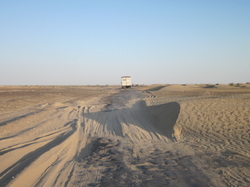
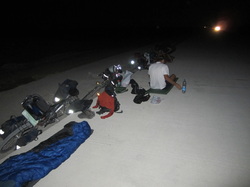
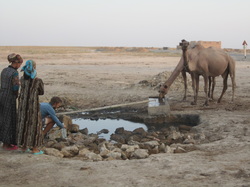
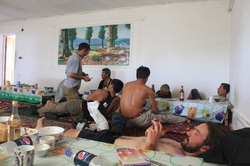
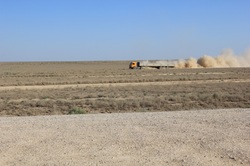
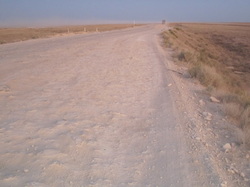
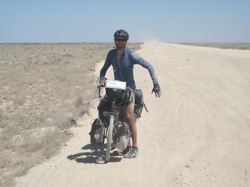
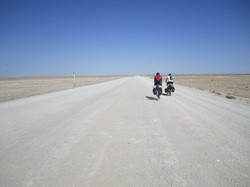
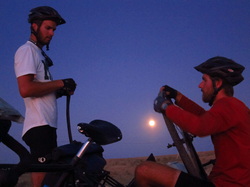
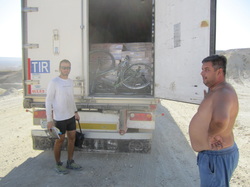
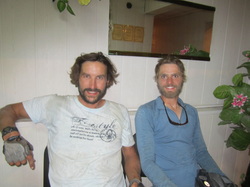
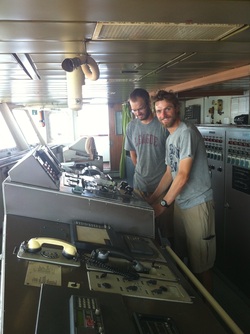
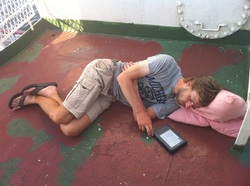
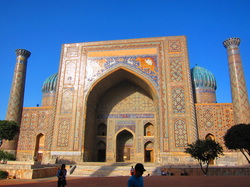
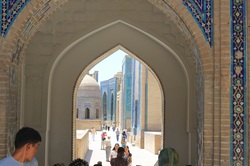
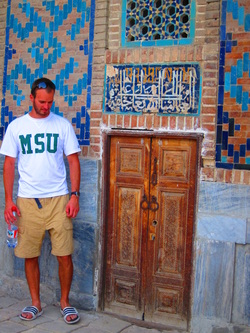
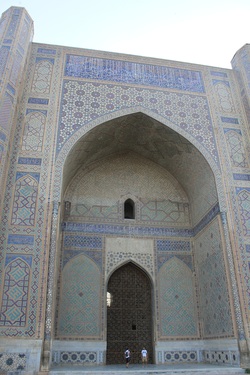
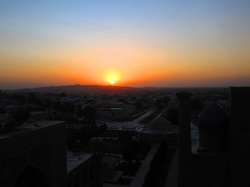
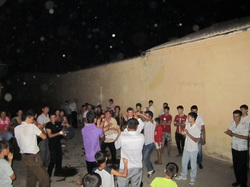
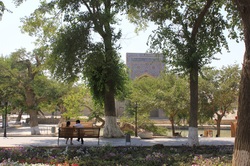
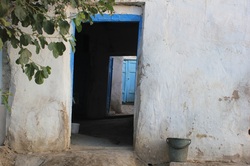
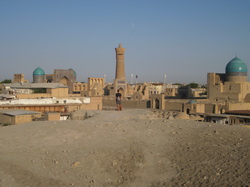
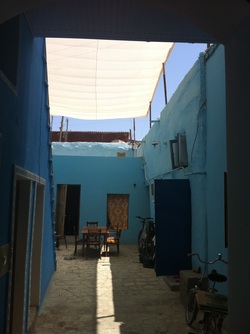
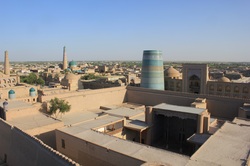
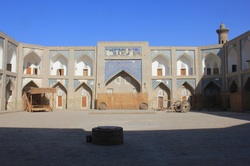
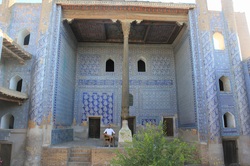
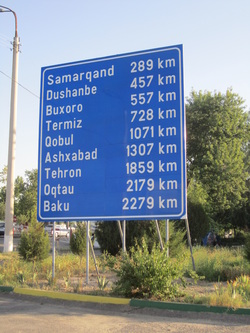
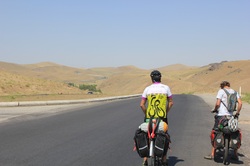
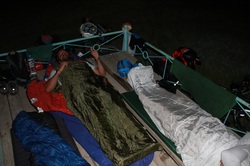
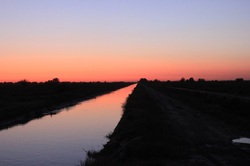
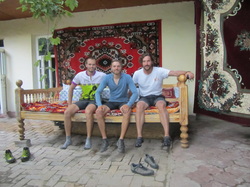
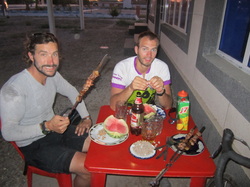
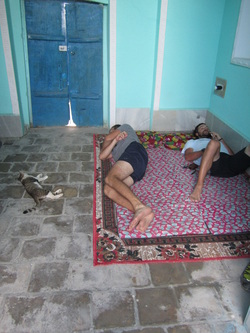
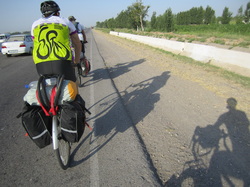
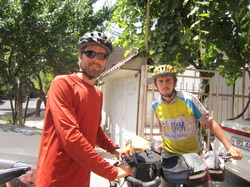
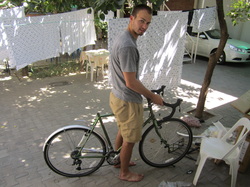
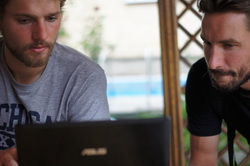
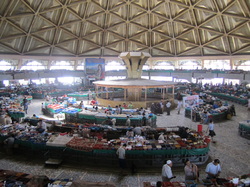
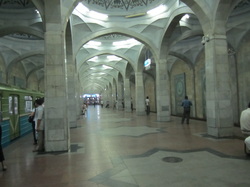
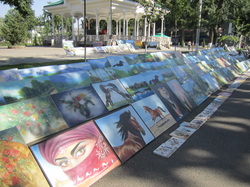
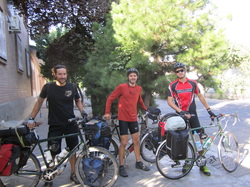
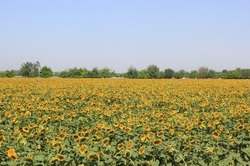
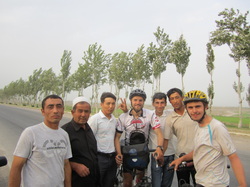
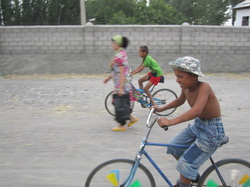
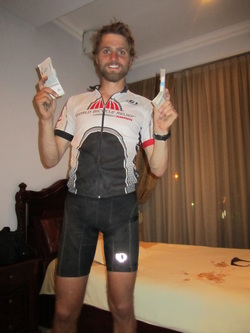
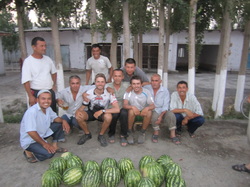
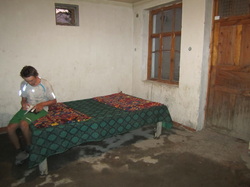
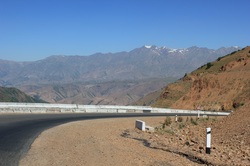
 RSS Feed
RSS Feed